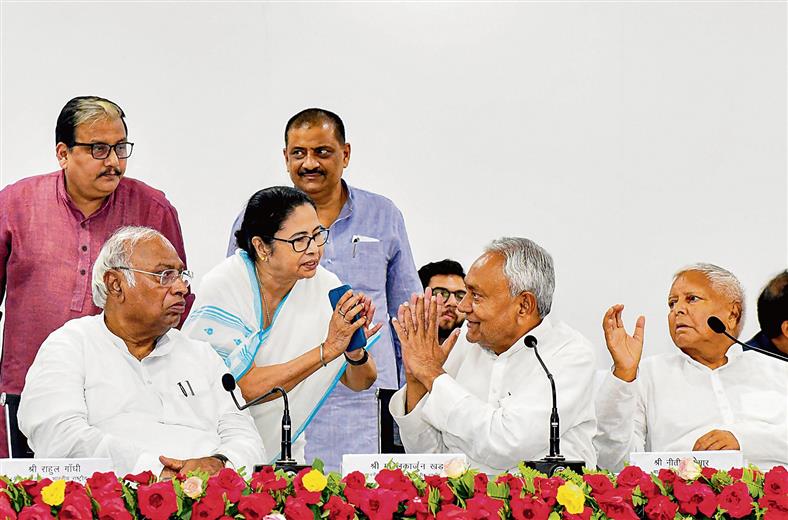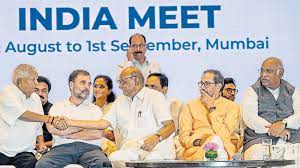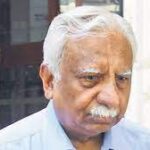The Indian National Developmental Inclusive Alliance (INDIA) shifted to election mode on Friday, announcing discussions on seat-sharing arrangements, key panels, and a public campaign the following month, in an attempt to wrest back the political momentum from the government, which has sparked furious speculation by announcing a special session of Parliament in the third week of September.
The INDIA group formed five panels, including a 14-member coordination and election strategy committee, and decided to campaign together for the 2024 elections a day after the government’s decision of the September 18-22 session sparked speculation of legislative action on simultaneous state and national elections, women’s reservation, or big-bang announcements.

But thorny issues loomed large over the 28-party bloc, which didn’t name a convener or unveil a logo — an issue that sparked concern among key constituents, and Trinamool Congress chief Mamata Banerjee’s early departure from the meeting sparked speculation, despite the TMC’s later explanation that it was a scheduling conflict.
A member stated that the election campaign could launch from Rajghat on October 2, the birthday of Mahatma Gandhi, with the bloc divulging its vision on issues such as unemployment, price rise, and Centre-state relations, and announcing alternative policies.
The group’s meeting in Mumbai was its most productive to date, and marked a shift from the ideological issues debated at previous events in Patna and Bengaluru to a road map for the upcoming general elections. Nonetheless, several leaders emphasized the sense of urgency, stating that elections could occur at any time — months ahead of schedule — and that INDIA must remain vigilant.
“We, the INDIA parties, resolve to jointly contest the upcoming Lok Sabha elections to the greatest extent feasible. According to a resolution adopted at the meeting, seat-sharing arrangements in different states will be initiated immediately and completed as soon as possible in a spirit of cooperation and compromise.
The coalition also decided to coordinate political communication and media strategies among its members under the campaign slogan “Judega Bharat, Jitega India” in multiple languages. “Parties will organize public rallies on issues of public concern and importance as soon as possible in different regions of the country,” it added.
According to informants, the alliance’s next meeting is likely to take place in Bhopal. In light of upcoming elections for the state legislature in the state, the location is crucial. The coalition is anticipated to hold its fourth meeting in the second state governed by the BJP.
Though crucial questions regarding seat-sharing arrangements and leadership remained unanswered, leaders reminded one another of the need to select the greatest number of common candidates, to remain vigilant against threats to their unity, and to demonstrate adaptability, as seat pacts and smooth coordination are decisive factors for the group.
At the meeting, however, West Bengal chief minister Mamata Banerjee and Bihar chief minister Nitish Kumar clashed when the latter suggested that the bloc’s commitment to a caste census be emphasized. Banerjee argued that the polling committee should debate such issues and stated that she will oppose any effort to link the census to religious issues.
“We weren’t together previously. We were unable to nominate candidates for every constituency, and (Prime Minister Narendra) Modi took advantage… A conclusion has been reached, and an organization has been founded. We will begin the process of seat sharing by accommodating everyone. Ex-Bihar chief minister Lalu Prasad stated that there will be no obstacles.
Rahul Gandhi, leader of the Congress, was “impressed” with how differences were “ironed out” in the meeting.
“We will propose a comprehensive set of concepts that will benefit farmers and the poor. The most important aspect of this alliance is the relationship between the leaders. I can confidently state that the two meetings have significantly contributed to the formation of a cohesive team. There are distinctions, but I see flexibility,” he stated.
In the meeting, leaders resolved to draft the resolution on seat arrangement to reflect the sense of urgency exhibited by Arvind Kejriwal, the convener of the AAP, and a number of other leaders. Later, Sitaram Yechury of the CPI(M) supported Banerjee’s proposal to bullet point the agenda.
Nevertheless, the group was unable to designate a convener due to the perceptible differences between its members.
The coordination and election strategy committee consisted of three former chief ministers — Sharad Pawar, Omar Abdullah, and Mehbooba Mufti — as well as the chief ministers of Jharkhand and Bihar, respectively. Congress leader KC Venugopal, Dravida Munnetra Kazhagam’s TR Baalu, Shiv Sena’s Sanjay Raut, Trinamool Congress’s second in-command Abhishek Banerjee, AAP Rajya Sabha member Raghav Chadha, Samajwadi Party leader Javed Ali Khan, Janata Dal (United) leader Lallan Singh, and Communist Party of India general secretary D Raja were the other members. The Communist Party of India-Marxist will also have a seat, but the identity of its representative has not been disclosed.
“We have established an infrastructure. We have pledged to share seats. The Forward Bloc’s G Devarajan stated, “We will unveil our platform on October 2 and launch our campaign.”
Nitish Kumar, the chief minister of Bihar, who declined a position at the meeting, outlined the alliance’s priorities. “We will conduct regular campaigns across the states… Now, however, there is no assurance of what may occur. Elections can occur at any time. “We must remain vigilant,” he stated.
Congress chief Mallikarjun Kharge and other leaders criticized Modi and the ruling dispensation for the recent decision to reduce the price of domestic gas by 200.
ALSO READ :Rajasthan CM Ashok Gehlot retracts judiciary statements
“Modi always increases 100 and then reduces 2,” The price of gasoline and liquefied petroleum gas has doubled, but he has only reduced the interest rate by 200. Kharge stated that Modi has never worked for the impoverished because his policy has always been to work closely with large industrialists.
At an informal meeting on Wednesday, the Chief Minister of Delhi, Arvind Kejriwal, insisted that seat negotiations must be concluded by September. he stated, “The INDIA alliance is not 28 parties, it is 140 crore people.”




